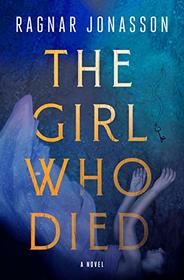No one does claustrophobic like Ragnar Jónasson. A tiny remote fishing village during an Icelandic winter is the perfect setting for The Girl Who Died. I really enjoyed the mystery Jónasson created, and I'm still angry with myself for not figuring out a very major clue, although math has never been my strong point. There are some interesting threads woven into the story; one about a World War II British and American lookout post for example, and then literary allusions that can remind readers of books like The Haunting of Hill House.
If I had any problem with the book at all, it was my reaction to Una, the whiner. Una, the terminally dissatisfied. First, she's glad to be out of Reykjavik. She doesn't miss the city at all. Then when the reality of the tiny village grows on her, she misses the luxuries she'd become accustomed to. Then she decides that she does, indeed, miss the city after all. She bemoans the fact that none of her friends make any real effort to get in touch with her, but I'm of the firm opinion that they're all undoubtedly rejoicing in the absence of her whining. It's hard to feel any sympathy for a character who's never ever happy about anything, a character who spends almost all her free time in wine-soaked pity parties.
There's quite the dichotomy in my reaction to The Girl Who Died. On the one hand, I really enjoyed the mystery itself and the spookiness and unease of the setting. On the other, I wanted to tape Una's mouth shut and lock her away in the attic. In conclusion, there's only one more thing I want to say about this book, and it's this: I had the opening bars of a song running through my mind during the last half of the story. I don't think I'll be the only one who thinks of The Girl Who Died as the Icelandic Hotel California.
(Review copy courtesy of the publisher and Net Galley)
If I had any problem with the book at all, it was my reaction to Una, the whiner. Una, the terminally dissatisfied. First, she's glad to be out of Reykjavik. She doesn't miss the city at all. Then when the reality of the tiny village grows on her, she misses the luxuries she'd become accustomed to. Then she decides that she does, indeed, miss the city after all. She bemoans the fact that none of her friends make any real effort to get in touch with her, but I'm of the firm opinion that they're all undoubtedly rejoicing in the absence of her whining. It's hard to feel any sympathy for a character who's never ever happy about anything, a character who spends almost all her free time in wine-soaked pity parties.
There's quite the dichotomy in my reaction to The Girl Who Died. On the one hand, I really enjoyed the mystery itself and the spookiness and unease of the setting. On the other, I wanted to tape Una's mouth shut and lock her away in the attic. In conclusion, there's only one more thing I want to say about this book, and it's this: I had the opening bars of a song running through my mind during the last half of the story. I don't think I'll be the only one who thinks of The Girl Who Died as the Icelandic Hotel California.
(Review copy courtesy of the publisher and Net Galley)
I normally appreciate books by Jonasson but this one was incredibly boring and the ending was a complete let down. If you are a fan of his books as I am, this is one to take a pass on.
Do you know your neighbors? Really? How well?
This small village out in back of the beyond keeps its secrets and doesn't let anyone into the fold.
This makes the new teacher a big outcast and not welcomed at all.
This was a OK read, not really up to Ragnar's other books so don't think you will be settling into a in-depth scary thriller-heck there wasn't even any snow!
This small village out in back of the beyond keeps its secrets and doesn't let anyone into the fold.
This makes the new teacher a big outcast and not welcomed at all.
This was a OK read, not really up to Ragnar's other books so don't think you will be settling into a in-depth scary thriller-heck there wasn't even any snow!




